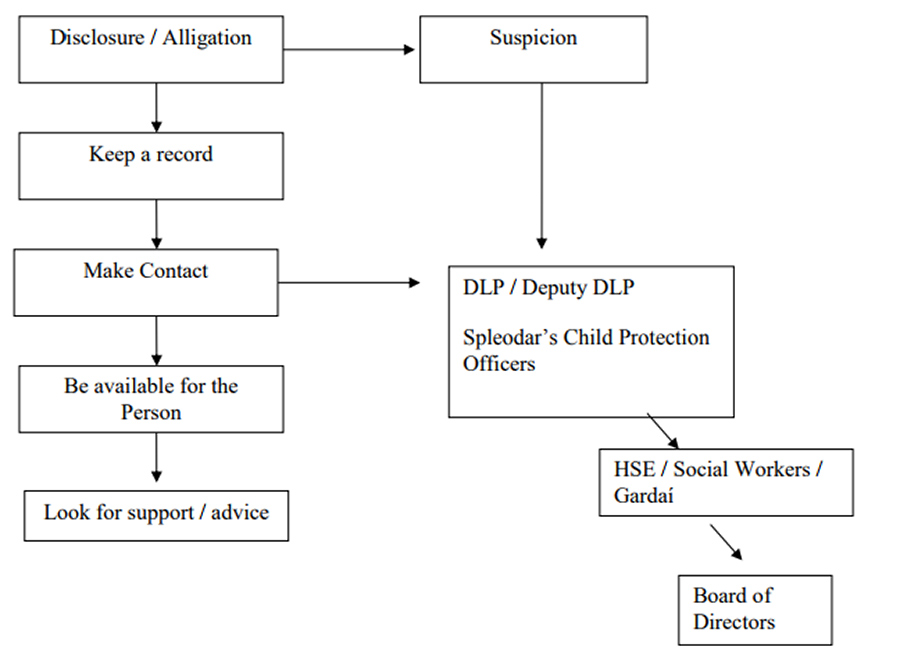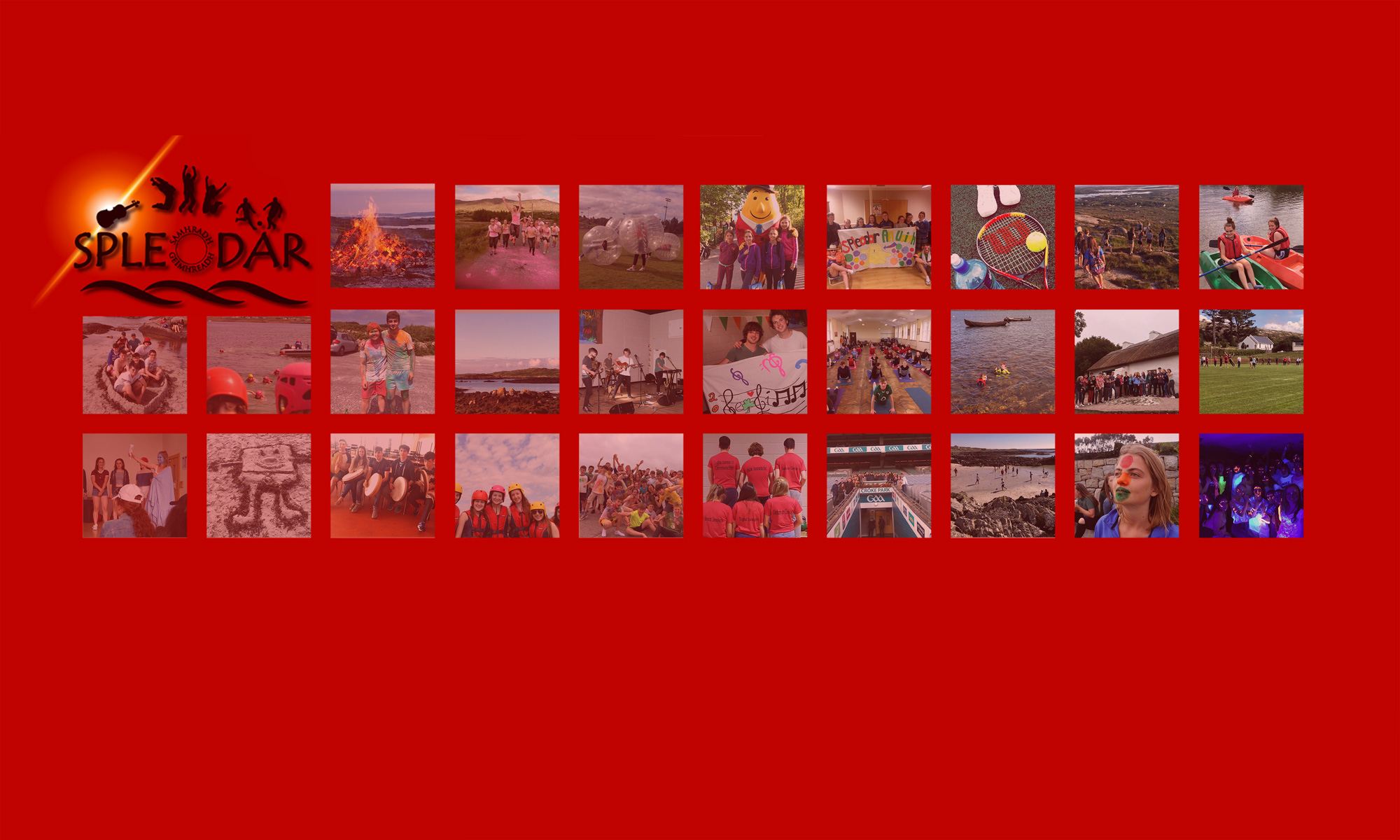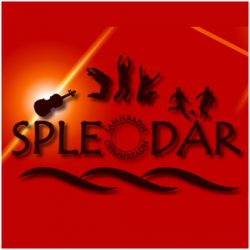You can download the current Spleodar Child Protection Policy (PDF) here: Child Protection Policy 2019/20
Spleodar is an organisation that works hard to ensure the welfare of all its staff and students.
We endeavour to provide training for the staff in relation to child protection to ensure the highest of standards at all times. This training will be provided to course directors and teachers before the courses.
Every course director will read through this policy at a staff meeting at the start of each course.
A poster displaying the contact details of the HSE social workers will be displayed in the office on all our courses and a poster will be displayed at the main entrance naming the DLP and the Deputy DLP. Another poster will also read ‘All visitors must report immediately to the main office’.
This policy must be followed if there is any question of abuse and immediate contact must be made with Spleodar’s Child protection officers. It is important to understand that in relation to Spleodar, child protection issues can relate to incidents on our courses but also to the students’ family lives at home.
Spleodar’s Code of Behaviour, Complaints Procedures and Health and Safety Policies also support this policy and these policies are explained to parents at the interview meetings organised prior to all courses.
All course directors inform students on their courses that they can come to them with any issues or concerns at any time during the course.
Definitions of Child Abuse:
Below there are descriptions of child abuse under five headings;
1. Neglect
2. Emotional Abuse
3. Physical Abuse
4. Sexual Abuse
5. Bullying
1. Neglect:
Neglect can be described in terms of an omission, where the child suffers significant harm or impairment of development by being deprived of food, clothing, warmth, hygiene, intellectual stimulation, supervision and safety, attachment to and affection from adults, and/or medical care.
2. Emotional Abuse:
Emotional abuse is normally to be found in the relationship between a parent/carer and a child rather than in a speci c event or pattern of events. It occurs when a child’s developmental need for affection, approval, consistency and security are not met. Unless other forms of abuse are present, it is rarely manifested in terms of physical signs or symptoms.
3. Physical Abuse:
Physical abuse of a child is that which results in actual or potential physical harm from an interaction, or lack of interaction, which is reasonably within the control of a parent or person in a position of responsibility, power or trust.
4. Sexual Abuse:
Sexual abuse occurs when a child is used by another person for his or her gratification or sexual arousal, or for that of others.
5. Bullying:
Bullying is described as threatening behaviour. It can be a verbal, a psychological or a physical attack on an individual or a group carried out against an individual or a group of people.
General:
- Be aware of your responsibilities in relation to the students and other members of staff.
- Sleeping arrangements are organised in such a way that boys and girls stay in separate accommodation under the direction of at least one leader of the same sex.
Accidents:
An accident book is kept where the students’ details are recorded, dated and signed by the teacher. It is advised that every case of bad behaviour is recorded in the behaviour book.
The following details should be recorded in the report:
1. What happened?
2. Who was present?
3. Time and place of the incident.
4. The different statements given by all those present.
5. Injuries or damage to people or equipment.
Accusations and Abuse:
- Be sure to record any allegations made by a student.
- Listen carefully to what is said by the student.
- Record what is being reported.
- Record date and time of allegation.
- Ask the person to sign the written report after it has been read out to them.
- Do not write on the report form after it has been signed by the person making the allegation and the person recording the disclosure.
Behaviour not accepted by Spleodar:
Staff will be aware of the correct boundaries that exist in working relationships and that a working relationship is not the same as friendship. This is important as occasionally unacceptable behaviour can begin when boundaries are unclear. The following behaviour is unacceptable amongst students and Members of staff:
- Belittling others
- Embarrassing others
- Favouring certain people over others
- Preventing certain people from participating in activities
- Insulting talk or actions
- Inappropriate contact and horseplay
- References to sex (in speech, actions, stories)
- Bullying (Physical or emotional)
- It is advised to be extremely careful when it comes to humour especially when there are sexual references. This is forbidden in front of students and members of staff.
This behaviour is not accepted. The statutory bodies may not be contacted in every case but Spleodar’s child protection policy will be implemented in all cases.
The following situations should be avoided when working with Spleodar:
- Never allow yourself to be in a situation where you are alone with one child
- Never take a child by yourself in the car
- Ensure all bedroom doors are left open except when students are changing clothes
- Never take children to the teachers’ house or to your own house
- It is advised that Spleodar’s leaders should not have more than ten students under their care
- Spleodar’s leaders and staff members are advised not to participate in sporting activities especially when it involves physical contact
- Extra precautions should be taken in certain situations, for example at the beach, on the bus, in the bedrooms
The Role of the DLP and the Deputy DLP when the DLP is not Present:
The DLP and the Deputy DLP operate as is outlined in the ‘Children First Guidelines 2011’. As well as this, they ensure that Spleodar’s Child Protection Officers are kept informed.
It is important that the following is remembered at all times;
It is the responsibility of all agencies working with children and for the public to recognise child protection concerns and share these with the agencies responsible for
assessing or investigating them, not to determine whether the child protection concerns are evidenced or not.
(Children First Guidelines, Pg. 16)
The DLP or Deputy DLP can call the HSE at any time to look for advice in relation to anything related to this subject and then follow the advice given from the HSE. The Gardaí will be called if the HSE social workers cannot be contacted in emergencies. If the advice given from the HSE is to report, ‘The Children First Guidelines 2011’ are to be followed without delay and the standardised report form is to be used. Parents are informed if a report is submitted in relation to their child apart from cases where it is felt that the child would be in further danger by doing so.
Reports are kept of all child protection incidents and concerns and everything is kept securely and confidently in the course offices. Only the DLP, the Deputy DLP and Spleodar’s Child Protection Officers will have access to these files. Information is shared only with those who need to be informed however Spleodar recognizes that it is never a breach of confidentiality or data protection when it is in the interest of child protection and child welfare.
Spleodar’s Child Protection Officers:
Spleodar has appointed Child Protection Officers.
Their role is as follows:
- Operate within the guidelines produced and agreed by Spleodar
- Provide evidence to the HSE or to the Gardaí in relation to cases where there is a suspicion or an allegation in relation to child abuse (Children First, 2011)
- To liaise between the staff, the committee / board, the course authorities and the national authorities when needed
- To establish contact with the course authorities
- To ensure there are supports available to those who have suffered and to staff members who have reported a case or who have allegations made against them
- To advise and give advice in relation to best practice around these topics
- To ensure training courses and workshops are available around child protection guidelines
- To discreetly keep secure and safe copies of all cases reported to them
- To remain up to date and informed in relation to the current changes in relation to best practice, services, supports, legal responsibilities and policies
If Spleodar’s Child Protection Officers are of the opinion that there is reason for concern in relation to a member of staff, that staff member must be removed from all activities until the case is fully investigated.
The Following are the steps to be followed by Spleodar if a suspicion or an allegation arises in relation to anyone in the organisation:

Cases not reported to the HSE or An Garda Síochána
In those cases where an organisation decides not to report concerns to the HSE or An
Garda Síochána, the individual employee or volunteer who raised the concern should
be given a clear written statement of the reasons why the organisation is not taking
such action. The employee or volunteer should be advised that if they remain
concerned about the situation, they are free as individuals to consult with, or report to,
the HSE or An Garda Síochána. The provisions of the Protections for Persons
Reporting Child Abuse Act 1998 apply once they communicate ‘reasonably and in
good faith’.
(Children First Guidelines 2011)
Current Practice in Relation to Hiring Staff:
Spleodar adheres to best practice in relation to hiring staff and all staff are Garda vetted.
Children First guidelines
More information on the Children First National Guidelines for the Protection and Welfare of Children is available here

